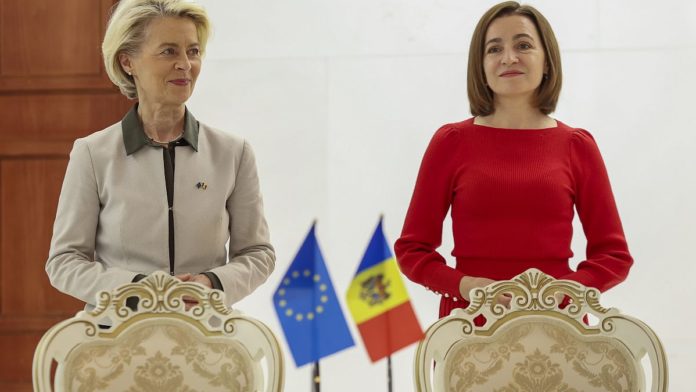National police chief Viorel Cernautanu revealed that over 130,000 Moldovans were bribed by a Russian network to promote pro-Kremlin candidates, raising concerns about malign influence.
Moldova has accused Moscow of interfering in the upcoming referendum on the country’s European Union membership bid, alleging it has poured significant funds to turn people against it and influence the vote.
Speaking to the press on Thursday, National police chief Viorel Cernautanu said more than 130,000 Moldovans had been bribed by a Russian network pushing pro-Kremlin candidates in a bid to derail attempts to grow closer to the EU.
With presidential elections set to be held on 20 October, alongside a referendum on whether the country should pursue its bid for EU membership, the news has raised concerns about corruption.
A “yes” could lead to further tensions between the pro-Western leadership and the Moscow-leaning breakaway region of Transnistria in the country’s east.
Cernautanu called the situation an “unprecedented, direct attack”, stating that some €13.5 million had been transferred in September alone to accounts opened at Russia’s Promsvyazbank.
Incumbent Moldovan President Maia Sandu — who is running for reelection — has been a vocal supporter of Moldova’s EU membership. The country formally applied for EU membership in March 2022, receiving a response including a series of nine steps to work on to further advance its bid.
Sandu’s 2020 election was viewed as a democratic turning point for many. The 51-year-old was an economist at the World Bank before turning her hand to politics. Currently leading in the polls, a record 11 candidates stand against her.
Ilan Shor: The oligarch buying off Moldovans
Israeli-born Moldovan oligarch Ilan Shor is one of the figures at the heart of the corruption allegations.
Shor currently lives in Moscow as a fugitive from Chisinau court, facing 15 years of imprisonment in Moldova due to his involvement in the so-called “Grand Theft Case”, which concerns the theft of $1 billion (€906m) from the nation’s banking system.
Posting on Telegram channels over the weekend, Shor announced he would pay people who would “convince as many people as possible at their polling station” to vote “no” in the referendum.
Moldova’s Information and Security Service (SIS) has reported that Shor is running a criminal group, which receives substantial funds from Moscow, in an attempt to derail Moldova’s efforts to foster closer relations with Europe.
Operating through a Telegram chatbot which registers people and assigns them “tasks”, Shor promised users “2,000 lei (€100) for fulfilling the minimum tasks” and “5,000 lei (€250) – if in your polling station, the majority are against the EU and choose our candidate [in the presidential election]”, reports regional outlet Balkan Insight.
Speaking to Russia’s state-owned TASS news agency, he described the bribery allegations as an “absurd spectacle” and accused Sandu’s Party of Action and Solidarity of accepting money from Western nongovernmental organisations.
Last year, Moldova’s Constitutional Court banned the pro-Russian Shor party, stating that the wave of anti-government protests led by the group were “unconstitutional”. In April 2024, Shor established a new group — the Victory Bloc — during a meeting at the Carlton Hotel in Moscow.
European and international condemnation
A debate with EU foreign policy chief Borrell and MEPs on the issue is set to take place next Tuesday. MEPs will then vote on a resolution surrounding Russia’s attempts to interfere in Moldova’s presidential elections on Wednesday.
In June, the US, Canada, and the UK issued a joint statement raising their “concerns about the Kremlin’s use of criminal groups to finance political activities and undermine Moldova’s democratic institutions.”
The statement went on to warn that the Kremlin intends to “incite protests in Moldova should a pro-Russia candidate not win,” the statement said.
“They seek to foment negative public perceptions of Western governments and Moldova’s incumbent leadership, while degrading public confidence in Moldova’s ability to secure itself and maintain rule of law.”


